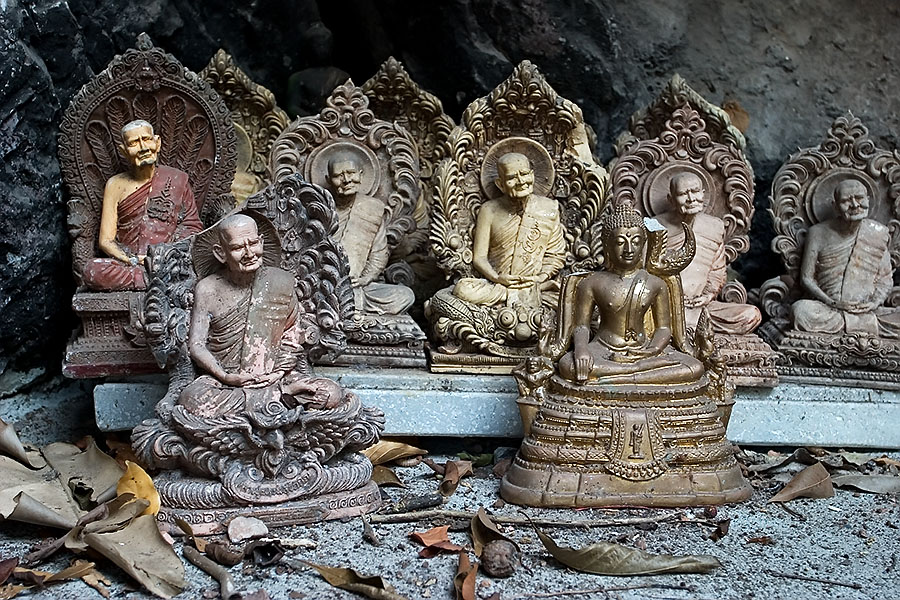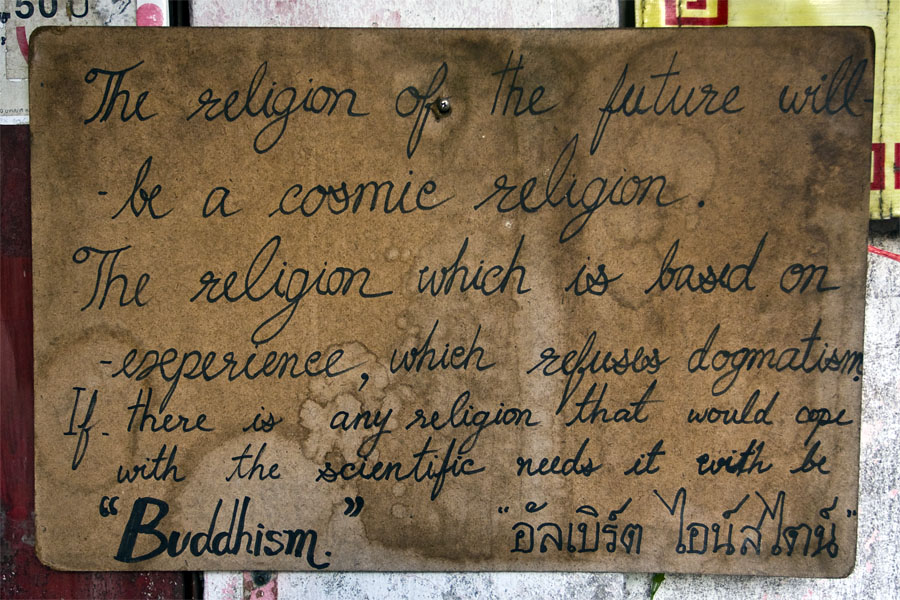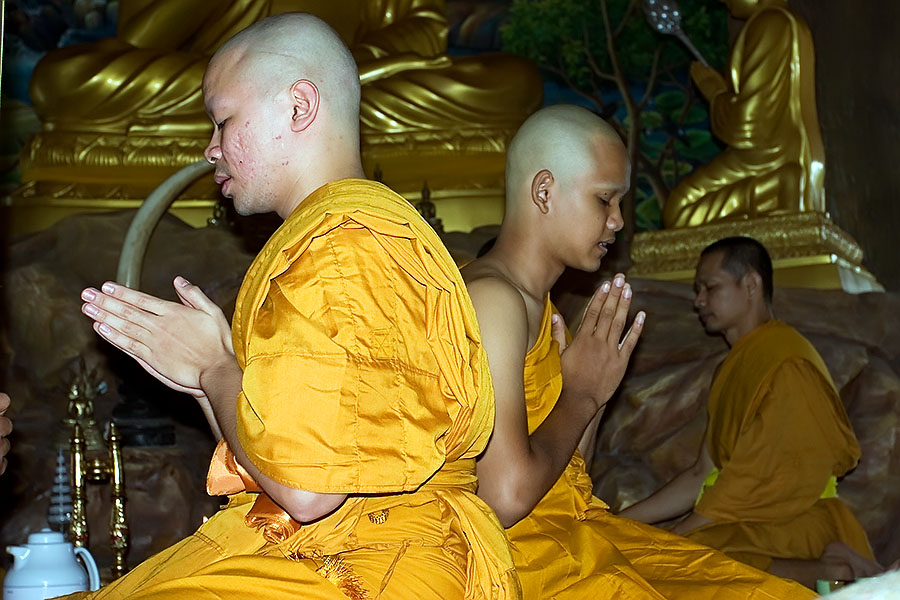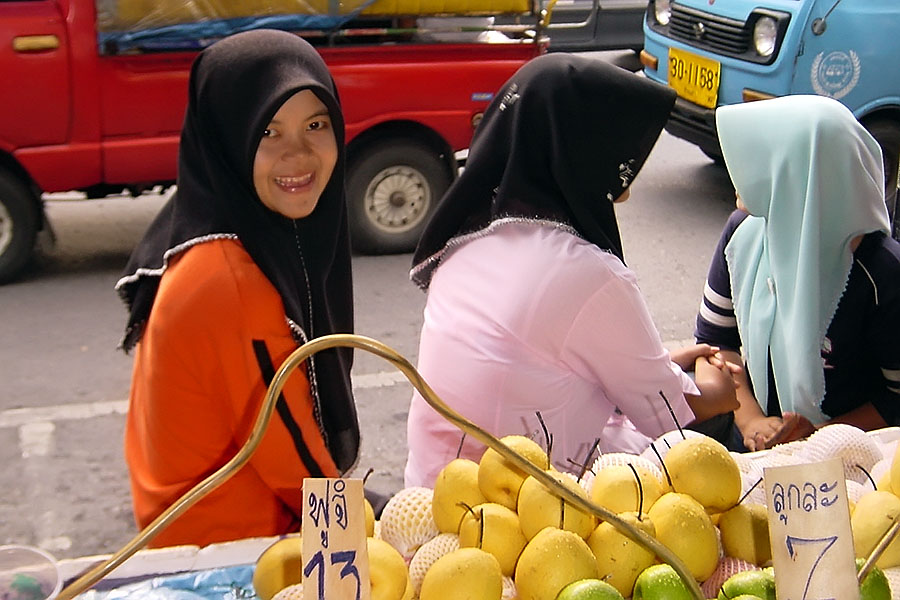Thailand - Religion
Buddhism
Meeting and talking with monks in Thailand can be an interesting and rewarding experience. Many of them speak a decent level of English and are very keen to speak with foreigners. Don't be concerned that they have entered monkhood for deeply religious purposes only and will just want to speak about religious matters. Most Thai men spend some time as a monk during their life. It is good for their own standing as well as for their families. Some spend only a short time in saffron robes (as little as a few days even) but the fact they have taken up an alms bowl is the important thing.

Monks in Chiang Rai
The young novice monks are no different to other young Thai lads their age. They play football, computer games and when they meet foreigners they may be more interested in football in your country than anything else. Monks are not allowed any physical contact with women and women should make a point of dressing appropriately if visiting Wats and monasteries. Monks do not accept money so be wary of supposed monks asking for money. Rogue monks masquerading as real monks are busted in Thailand fairly regularly. They have robes, envelopes for monetary contributions to the Wat, alms bowls, all the paraphernalia but they are fakes.

Monks outside a dental hospital
I sometimes look at what is going on in Thailand and think that in any other country it would only be two steps away from complete anarchy. Self-serving politicians govern the country and corruption is a way of life at all levels of society with anyone in a position of authority thinking they have the right to look after themselves before they do anything for the common good. There is a general feeling that people do just what they want. This is especially noticeable on the roads where drivers completely ignore road rules. But not just while driving. Thais will play music as loud as they want, smoke where they want regardless of no smoking signs, etc. etc.
Nonetheless, if you've spent any time in Thailand you just know that there isn't going to be a complete breakdown of law and order in society, even though there will always be outbreaks of sporadic violence. The people are just too laid back, too friendly, too gentle, enjoy life too much. But why is this?
I think there are several combined factors. The hot climate isn't conducive to expending energy unnecessarily which I think partially accounts for this attitude but there are other hot countries where this isn't the case. The country benefits from a stable, caring and highly respected monarchy.

Buddha and monk images, Phattalung
An important factor, I believe, is Theravada Buddhism, the predominant religion in Thailand practiced by around 95% of the population. I don't actually regard it as a religion so describing it as such here is a bit misleading. I see it more as a philosophy on how to live life, a philosophy that has been thought out very carefully with a deep understanding of the human condition. It doesn't make any great promises about life or set expectations, nor does it demand any great leaps of faith. Instead it accepts life for what it is and says that in life there will be suffering. That's a fact, so deal with it. Buddhism tells its followers that 'grasping' leads to dissatisfaction and the way to eliminate the dissatisfaction and unhappiness is to stop the grasping. It is very logical and pragmatic.
The relationship between Buddhist Thais and Buddhism is a complex one. There are many aspects of Thai behaviour and culture I can relate to Buddhist beliefs. Just taking two, impermanence and non-attachment, explains many things to me about Thai attitudes to life. However, watching a prostitute wai, make an offering to a Buddha image and then continue with her work can seem a bit puzzling and hypocritical when the Eightfold Path of Buddhism advocates right bodily conduct and right livelihood. But Buddhists are pragmatic and realistic people. In a country with many poor people, people need to take care of their families and they will do this however they can.

Hollow Buddha images used to inter cremation ashes
The girls aren't proud of what they do but for many this is the only way they can earn a decent wage and you will find that most send the money straight home to support parents and siblings. Dealing with the practicalities of life comes first. They understand this and so do other Thais so there is a view of acceptance and tolerance. There are no religious zealots demanding they be stoned for what they do. The same tolerance applies to people who have other faiths and beliefs. It's a very healthy way of thinking.
Religious tolerance and tolerance in general towards other people, religions and faiths is one of the things that appeals to me most about Buddhism.

Albert Einstein quote about Buddhism
I have only just started to scratch the surface and I have not learnt how to meditate yet, which is an important part of practicing Buddhism. In a spiritual moment while in a Wat in Thailand I was quietly contemplating my own life when I was approached by a monk and given a small booklet called "Buddhism In A Nutshell". I read through it but a lot of what I read didn't sink in so I read it again and wrote it all out which I find helps to make things stick in my mind. If you are interested, click on the following link. "Buddhism In A Nutshell first appeared in 1933. It contains the important messages about Buddhism but the writing style and quotes from obscure people can be a bit heavy going.
Buddhist Ordination
It is still traditional for Thai males to enter the monkhood temporarily for a short period of time. Ordination is a rite of passage into adulthood and earns them much respect from the community. It also brings a lot of honour to their families and is an important merit-making act.

Two young Thai males being ordained as Buddhist monks
The normal age is early 20's and prior to marriage. The idea is that all the merit achieved goes to their parents. If they are married half will go to their wife which isn't desirable.
The traditional period for entering the temple to don saffron robes and take up an alms bowl is the three month 'Rains Retreat' which begins in July or August. However, many young men stay only for a couple of weeks or even just a few days. They obviously don't learn as much about Buddhism by only staying for a short time but they still earn merit.
The picture is of the son and nephew of one of my Thai friend's, who were ordained together. They spent two weeks as monks. I was very pleased to have been invited to observe the ceremony.
Buddhism In A Nutshell
There are many excellent books about Buddhism available for free distribution but unfortunately I have never seen any in Thailand. I have read many of these and all were obtained in Singapore. It's a little ironic that these publications on spiritualism were easily obtainable in a place where I have witnessed very little spiritualism but lots of greed and an unhealthy obsession with money but life is funny that way.

Thailand where Hinduism meets Brahmanism meets Buddhism
If you are interested in picking up some books to learn more about Buddhism and get the opportunity to go to Singapore there are two places I can recommend:
The Buddhist Education Centre
271 Bukit Timah Road
#01-06 Balmoral Plaza
Singapore 259708
Tel: 6836 9088
The other place is the Foodmore Food Centre where there is a Buddhist book centre. It's on Rochor Canal Road close to Sim Lim Square and Little India. The books are available for free distribution but donations are appreciated.
These are just two places but there are others. The Kong Meng San Phor Kark See Monastery appears to be the organisation behind the printing of many of these books.
Dhamma Moments by Danai Chanchaochai
This is a good book. I have quite a few books on Buddhism sitting on my bookshelf but I find that some are almost impossible to read. One in particularly, a very old text from A.D. 705 that has been through several translations, I found completely inaccessible.
Dhamma Moments is at the other end of the spectrum as far as accessibility is concerned. It was only published in 2003 and consists of several short, unrelated chapters. Each chapter was originally published in the Bangkok Post and for this reason they can be read on their own or out of sequence and not as part of a book.
The author is undoubtedly a very wise and perceptive man. What I love about the book is how it relates Buddhism to everyday life in the modern world. But it's more than just Buddhism. It is a book that can be read by anyone, of any faith, to give guidance on how to live a better life.
It is one of the only books I continue to re-read. Because of the way it is structured there is no need to read from beginning to end each time. I just pick it up and read a chapter or two when the mood suits.
The details are below. It might be tricky to get hold of outside Thailand but getting a copy in Thailand should be no problem at all.
Dhamma Moments
by
Danai Chanchaochai
ISBN: 974-91347-4-5
Published by:
DMG Books, Direct Media Group (Thailand) Co., Ltd.
11th Floor, Tonson Tower, 900 Ploenchit Road
Patumwan, Bangkok 10330, Thailand
Tel: +66 2 658 6433 Fax: +66 2 658 6448-9
E-mail: postbooks@bangkokpost.co.th
Islam
The southern Thai provinces of Narathiwat, Yala, Pattani and to some extent Songkhla have large populations of Muslims. Other southern Thai provinces also have significant Muslim populations including tourist areas such as Phuket, Krabi and Phang Nga. The vast majority of Thai Muslims are very moderate and peace-loving people.

Young Muslim girl in Songkhla province
For many years the southernmost provinces have been affected by separatist insurgency and violence flared up again at the beginning of 2004. Two years later, over 1,100 people have been killed and there is still no end in sight to the problems. The problem is coming from a small number of extreme Muslim separatist groups but hasn't been helped by the Thai government's heavy-handed response.
For some time now, and especially since 11th September 2001, the Western world has demonised Muslims. The images of Muslims portrayed in the West are normally the worst kind, of extremist suicide bombers and the like, bent on death and destruction. My general view of Islam from living in the West was not a particularly good one. Living in Thailand for a while has helped me to get a more balanced view. Some of the nicest people I have met here have been Muslims and not one has given me a problem, unlike some of the ethnic Thais and Chinese.
The picture is of a young Muslim girl at the local market. It's horribly out of focus but I have put it here for a good reason. Earlier that day on TV there had been more violence reported in Narathiwat. I was thinking about this while walking through the market looking at fresh fruit. As I was looking at the fruit I noticed this girl staring at me out of curiosity. When I looked back at her she gave me a huge smile.
There was not a trace of hatred in her face, in fact the complete opposite. Her face was full of kindness and compassion. It struck me that so many people in the world regard all Muslims as bad now but in denouncing an entire religion they include this young girl as well. It was quite a touching moment for me. Her smile made me feel very happy but all of a sudden I felt extreme sadness at the state of the world today.
I am not an expert on any kind of religion, especially Islam. However, I have tried to find out more by reading information from such sources as the Wikipedia on-line encyclopedia. Islam shares the same moral codes as other religions and is morally good like other religions.
What strikes me though is the lack of tolerance for any other beliefs. And it is the same for fundamentalist Christians, not just Muslims. This lack of tolerance is what is causing most of the world's problems today and unless people can start to demonstrate some degree of religious tolerance the situation won't improve.
Brahmanism, Animism, Astrology and Superstition
This is actually a huge subject but I won't dwell. There is lots of information elsewhere on the Internet. Suffice to say, not everything you see in Thailand has its roots in Buddhism.
Evidence of Brahmanism is everywhere, most famously at the Erawan Hotel in Bangkok where, every day, thousands of Thais pay their respects at the Shrine of the four-faced Brahma.

Various items on sale believed to have magical powers
Brahmanism manifests itself in many royal ceremonies such as the royal ploughing ceremony and royal events such as births, deaths, coronations and marriages. The giant swing near Wat Suthat in Bangkok is used for Brahmanic ceremonies.
Evidence of animism is seen outside almost all Thai buildings, whether a small house or a huge hotel, in the form of spirit houses. Offerings are made to keep the guardian spirits of the property happy. Most Thais are terrified of ghosts (pii) and it is a real fear. The aftermath of the tsunami really brought home to me how real this fear was and some Thais are afraid to visit museums where there are lots of old possessions because of their fear of ghosts.
Fortune tellers can be found in most towns and they do good business. The current Prime Minister consults his astrologer before making any decision and will refuse to comment on something if the timing is not auspicious.
There is a thriving trade in amulets and religious artefacts that have been blessed by monks possessing magic powers. The picture shows a street trader trading in such items.
In parts of Thailand where there are lots of Chinese you will see lots of evidence of ancestor worship as letters and paper images of material items are burned to transport them to the afterlife.

Fortune teller in Songkhla
Much of this stuff pre-dates Buddhism but it is still a strong part of the Thai belief system. It's easy to confuse different beliefs but, as Niels Mulder points out, it is irrelevant. It is Thais trying to harness supernatural power.
Whether through a Buddhist merit-making ceremony, paying homage at the Erawan shrine or leaving some food and drinks in the spirit house it is a case of doing a favour in order to have the favour returned.
To find out more, the Niels Mulder book 'Inside Thai Society' offers lots of insights. More details about the book on my 'Thai Culture' page.
Karma
I believe that 'What goes around comes around'. It's also a massive part of the Thai belief system and in Thailand it is used along with Confucianist teachings where law would be used in other countries.
The rule of law is exceptionally weak in Thailand, but by reinforcing the notion that people will suffer karmic retribution in this life or the next if they do bad things, the hope is that they won't do bad things. It works with a lot of Thais, but in every society there will always be bad people who do bad things regardless of the consequences - whether the consequences are punishments from the justice system or from higher powers.
The problem in Thailand is that beliefs and cultural behaviour always go too far. Mai bpen rai can be the equivalent of not crying over spilt milk, which is a good thing, but the notion of mai bpen rai goes way too far in Thailand and Thais end up not worrying about things that they should worry about.
According to Thai thinking nothing ever happens without a karmic reason, but the thinking goes too far. My wife had become stressed about something, but I wasn't sure what it was.
When our daughter was born her feet were turned inwards. This is a fairly common birth deformity. It can be treated and no one is quite sure why it happens. Our second child didn't have the problem and there is no history of this in either of our families. It just happens.
However, several Thais had told my wife it was her fault because she must have been cruel to grasshoppers in the past. Even the doctor who treated our daughter mentioned to my wife that it had something to do with karma.
This kind of thing annoys me because it's superstitious, it serves no purpose, and it just makes people feel guilty.
Immediately, after the big Nepal earthquake in 2015 there was a lot of sympathy in Thailand. Thais started raising funds to help the victims and Thai doctors volunteered to go to help.
However, lots of Thais use social media and soon after the quake some videos started circulating showing Nepalese killing animals for no reason. This changed the tide of opinion with many people in Thailand and Thais then started saying that the earthquake was karmic retribution for killing animals.
Don't they understand about tectonic plates and the way the Earth's crust moves? Apparently not. With Thais there is never a logical or scientific reason for something happening, only ever a superstitious one.

